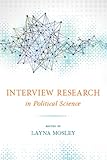Interview Research in Political Science / ed. by Layna Mosley.
Material type: TextPublisher: Ithaca, NY : Cornell University Press, [2013]Copyright date: ©2013Description: 1 online resource (312 p.) : 5 tablesContent type:
TextPublisher: Ithaca, NY : Cornell University Press, [2013]Copyright date: ©2013Description: 1 online resource (312 p.) : 5 tablesContent type: - 9780801478635
- 9780801467974
- 320.072/3 23
- H61.28 .I58 2013eb
- online - DeGruyter
- Issued also in print.
| Item type | Current library | Call number | URL | Status | Notes | Barcode | |
|---|---|---|---|---|---|---|---|
 eBook
eBook
|
Biblioteca "Angelicum" Pont. Univ. S.Tommaso d'Aquino Nuvola online | online - DeGruyter (Browse shelf(Opens below)) | Online access | Not for loan (Accesso limitato) | Accesso per gli utenti autorizzati / Access for authorized users | (dgr)9780801467974 |
Frontmatter -- Contents -- Preface -- List of Contributors -- Introduction. "Just Talk to People"? Interviews in Contemporary Political Science -- Part 1. GENERAL CONSIDERATIONS: RESEARCH DESIGN, ETHICS, AND THE ROLE OF THE RESEARCHER -- 1. Aligning Sampling Strategies with Analytic Goals -- 2. The Ethical Treatment of Human Subjects and the Institutional Review Board Process -- 3. The Power of the Interviewer -- 4. How to Report Interview Data -- Part 2. ADDRESSING THE CHALLENGES OF INTERVIEW RESEARCH -- 5. Crafting Interviews to Capture Cause and Effect -- 6. Using Proxy Interviewing to Address Sensitive Topics -- 7. Working with Interpreters -- 8. The Problem of Extraterritorial Legality -- Part 3. PUTTING IT ALL TOGETHER: THE VARIED USES OF INTERVIEW DATA -- 9. Capturing Meaning and Confronting Measurement -- 10. Elite Interviewing in Washington, DC -- 11. Lessons from the "Lobbying and Policy Change" Project -- 12. Using Interviews to Understand Racial Group Identity and Political Behavior -- Appendix: Sample Materials for Interview Research -- Notes -- References -- Index
restricted access online access with authorization star
http://purl.org/coar/access_right/c_16ec
Interviews are a frequent and important part of empirical research in political science, but graduate programs rarely offer discipline-specific training in selecting interviewees, conducting interviews, and using the data thus collected. Interview Research in Political Science addresses this vital need, offering hard-won advice for both graduate students and faculty members. The contributors to this book have worked in a variety of field locations and settings and have interviewed a wide array of informants, from government officials to members of rebel movements and victims of wartime violence, from lobbyists and corporate executives to workers and trade unionists.The authors encourage scholars from all subfields of political science to use interviews in their research, and they provide a set of lessons and tools for doing so. The book addresses how to construct a sample of interviewees; how to collect and report interview data; and how to address ethical considerations and the Institutional Review Board process. Other chapters discuss how to link interview-based evidence with causal claims; how to use proxy interviews or an interpreter to improve access; and how to structure interview questions. A useful appendix contains examples of consent documents, semistructured interview prompts, and interview protocols.Contributors: Frank R. Baumgartner, The University of North Carolina at Chapel Hill; Matthew N. Beckmann, University of California, Irvine; Jeffrey M. Berry, Tufts University; Erik Bleich, Middlebury College; Sarah M. Brooks, The Ohio State University; Melani Cammett, Brown University; Lee Ann Fujii, University of Toronto; Mary Gallagher, University of Michigan; Richard L. Hall, University of Michigan; Marie Hojnacki, Pennsylvania State University; David C. Kimball, University of Missouri, St. Louis; Beth L. Leech, Rutgers, the State University of New Jersey; Julia F. Lynch, University of Pennsylvania; Cathie Jo Martin, Boston University; Lauren Maclean, Indiana University; Layna Mosley, The University of North Carolina at Chapel Hill; Robert Pekkanen, University of Washington; William Reno, Northwestern University; Reuel R. Rogers, Northwestern University
Issued also in print.
Mode of access: Internet via World Wide Web.
In English.
Description based on online resource; title from PDF title page (publisher's Web site, viewed 02. Mrz 2022)


